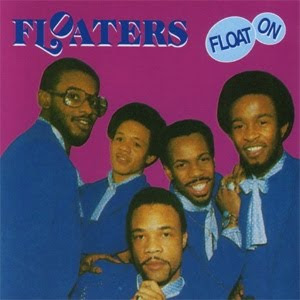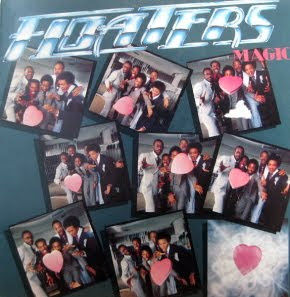 It’s not entirely unheard of for a band or artist to score a major hit with a song that features part, or all of the artist’s name in its title. ‘Wham Rap (Enjoy What You Do) by Wham!, ‘Antrap’ and ‘Antmusic’ by Adam and the Ants, ‘In A Big Country’ by Big Country, ‘The Loved One’ by Loved Ones, ‘Human’ by Human League, ‘Living In A Box’ by Living In A Box, and ‘Who Are You’ by The Who - to name a few. Another artist to score a hit with a song title comprising in part their own name, was the Detroit based R&B/soul vocal quintet The Floaters. Their one and only foray into the charts was the worldwide smash ‘Float On’, which floated to the upper reaches of the charts during the second half of 1977. ‘Float On’ not only bore a close association with the group’s name, but the song’s lyrics also served to highlight each individual member of the group - nothing like a bit of self promotion to get
It’s not entirely unheard of for a band or artist to score a major hit with a song that features part, or all of the artist’s name in its title. ‘Wham Rap (Enjoy What You Do) by Wham!, ‘Antrap’ and ‘Antmusic’ by Adam and the Ants, ‘In A Big Country’ by Big Country, ‘The Loved One’ by Loved Ones, ‘Human’ by Human League, ‘Living In A Box’ by Living In A Box, and ‘Who Are You’ by The Who - to name a few. Another artist to score a hit with a song title comprising in part their own name, was the Detroit based R&B/soul vocal quintet The Floaters. Their one and only foray into the charts was the worldwide smash ‘Float On’, which floated to the upper reaches of the charts during the second half of 1977. ‘Float On’ not only bore a close association with the group’s name, but the song’s lyrics also served to highlight each individual member of the group - nothing like a bit of self promotion to get  noticed.
noticed.The Floaters were inflated during 1976 as the brainchild of former Detroit Emeralds members, James Mitchell and Marvin Willis. The Detroit Emeralds were also an R&B style vocal group, who had notched up a string of U.S. Hot 100 hits during the late 60s and early 70s, including ‘Do Me Right’ (US#43), and ‘Baby Let Me Take You (In My Arms)’ (US#24). Mitchell and Willis split from the group during 1974 to focus on song writing and production. James Mitchell recruited his brother Paul (baritone vocals), along with Larry
 Cunningham (tenor vocals), Ralph Mitchell (no relation - tenor vocals), and lead vocalist Charles Clark, most of whom hailed from the Sojourner Truth housing project, on Detroit’s Eastside.
Cunningham (tenor vocals), Ralph Mitchell (no relation - tenor vocals), and lead vocalist Charles Clark, most of whom hailed from the Sojourner Truth housing project, on Detroit’s Eastside.James Mitchell was apparently inspired to pen the song ‘Float On’ via a dream - not unlike Paul McCartney once dreamed up some scrambled eggs (‘Yesterday’), and Bob Dylan once had a ‘Series Of Dreams’. He rounded out the song with the help of Marvin Willis and Arnold Ingram. Originally, ‘Float On’ had been penned as an instrumental, and was intended to be used as a link between album tracks. Mitchell felt the tune had a strong enough melody to be fleshed out into a fully fledged song. Some lyrics were hastily constructed to overlay the basic instrumental track. ‘Float On’ was your run of the mill
 mellow, slow tempo, R&B styled track, over which each of the four main vocalists contributed an individual spoken word vocal. Each spoken word vocal was used to spotlight the individual member at the microphone, starting with their astrological sign, their name, and the kind of woman that they liked - a bit like a lonely hearts classified put to music. Hence, Ralph was an Aquarius who preferred a woman who “likes their freedom” and “can hold their own”; Charles was a Libran who liked a “quiet” woman that “carries herself like Miss Universe”; Paul was a Leo who wasn’t overly choosy because he liked “all women of the world”; Larry was a Cancerian and specified he liked “a woman who loves everything and everybody” (read into that what you will). If any lucky lady possessed the necessary attributes, they were invited to take The Floaters’ hand and join them in “Love Land”, which
mellow, slow tempo, R&B styled track, over which each of the four main vocalists contributed an individual spoken word vocal. Each spoken word vocal was used to spotlight the individual member at the microphone, starting with their astrological sign, their name, and the kind of woman that they liked - a bit like a lonely hearts classified put to music. Hence, Ralph was an Aquarius who preferred a woman who “likes their freedom” and “can hold their own”; Charles was a Libran who liked a “quiet” woman that “carries herself like Miss Universe”; Paul was a Leo who wasn’t overly choosy because he liked “all women of the world”; Larry was a Cancerian and specified he liked “a woman who loves everything and everybody” (read into that what you will). If any lucky lady possessed the necessary attributes, they were invited to take The Floaters’ hand and join them in “Love Land”, which  led into the chorus harmonies of “Float, float on”. The track would have sat comfortably in the pages of a Stylistics or Spinners songbook, and when ABC Records released ‘Float On’ in mid ’77, it immediately glided into the upper reaches of the charts. By August of ‘77, ‘Float On’ had soared to #2 on the U.S. Hot 100 (#1 R&B charts), and reached a peak altitude of #1 on the British charts, where it hovered for one week (OZ#16). I scored a copy of the track on CD via its inclusion on Volume 3 of the BMG compilation series ‘Living In The 70s’. A few months after The Floaters hit the top of the charts with ‘Float On’, the comic team of Cheech and Chong released a parody single titled ‘Bloat On’. It was the duos last foray into the U.S. singles charts, and peaked at #41 on the Hot 100 late in ‘77 (see separate post on Cheech and Chong).
led into the chorus harmonies of “Float, float on”. The track would have sat comfortably in the pages of a Stylistics or Spinners songbook, and when ABC Records released ‘Float On’ in mid ’77, it immediately glided into the upper reaches of the charts. By August of ‘77, ‘Float On’ had soared to #2 on the U.S. Hot 100 (#1 R&B charts), and reached a peak altitude of #1 on the British charts, where it hovered for one week (OZ#16). I scored a copy of the track on CD via its inclusion on Volume 3 of the BMG compilation series ‘Living In The 70s’. A few months after The Floaters hit the top of the charts with ‘Float On’, the comic team of Cheech and Chong released a parody single titled ‘Bloat On’. It was the duos last foray into the U.S. singles charts, and peaked at #41 on the Hot 100 late in ‘77 (see separate post on Cheech and Chong). The Floaters released their self titled debut album as ‘Float On’ was floating high in the charts. Co-produced by James Mitchell, Marvin Ellis, and Woody Wilson, the album garnered most of its sales off the back of interest in the hit single (US#10/UK#17/ OZ#28), though an eleven minute version of the song featured on the album. The follow up single, ‘You Don’t Have To Say You Love Me’, managed to stumble to #28 on the R&B charts in the U.S., and paled in comparison to ‘Float On’. The balance of the album comprised a mixture of soul, R&B, and even doo-wop style numbers, but nothing of the ilk of ‘Float On’.
The Floaters released their self titled debut album as ‘Float On’ was floating high in the charts. Co-produced by James Mitchell, Marvin Ellis, and Woody Wilson, the album garnered most of its sales off the back of interest in the hit single (US#10/UK#17/ OZ#28), though an eleven minute version of the song featured on the album. The follow up single, ‘You Don’t Have To Say You Love Me’, managed to stumble to #28 on the R&B charts in the U.S., and paled in comparison to ‘Float On’. The balance of the album comprised a mixture of soul, R&B, and even doo-wop style numbers, but nothing of the ilk of ‘Float On’.In 1978, The Floaters attempted to maintain their buoyancy with the release of their sophomore album ‘Magic’ (US#131). The lead out double A-side single ‘Magic (We Thank You)/I Just Want To Be With You
 ’ was a classy offering of mellow R&B, but sunk without a trace. The Floaters weren’t afraid to explore beyond the standard R&B ballad, which formed the cornerstone of the album, tinkering with some up tempo grooves, and even reggae - but in 1978 disco held sway over most everything else on offer, and smooth, soulful ballads were floating against the tide to make an impact on the charts. The Floaters launched one more shot at hitting the big time again, via their optimistically titled 1979 album, ‘Float Into The Future’. The group recruited the services of producer/writer Eugene McDaniels, better known as Gene McDaniels, who had scored a string of hit singles in the 60s, including ‘A Hundred Pounds Of Clay’, and the brilliant ‘Point Of No Return’. McDaniels had previously weaved his production magic for Roberta Flack on several albums. Sadly, the magic couldn’t be
’ was a classy offering of mellow R&B, but sunk without a trace. The Floaters weren’t afraid to explore beyond the standard R&B ballad, which formed the cornerstone of the album, tinkering with some up tempo grooves, and even reggae - but in 1978 disco held sway over most everything else on offer, and smooth, soulful ballads were floating against the tide to make an impact on the charts. The Floaters launched one more shot at hitting the big time again, via their optimistically titled 1979 album, ‘Float Into The Future’. The group recruited the services of producer/writer Eugene McDaniels, better known as Gene McDaniels, who had scored a string of hit singles in the 60s, including ‘A Hundred Pounds Of Clay’, and the brilliant ‘Point Of No Return’. McDaniels had previously weaved his production magic for Roberta Flack on several albums. Sadly, the magic couldn’t be  captured again for The Floaters, with funk style singles like ‘Levitation’ getting lost in the torrential disco deluge. The Floaters missed the funk/disco boat, and were left high and dry as genuine one hit wonders, a title that seemed at odds with the obvious talent in (and surrounding) the group. Over subsequent years The Floaters stayed afloat, in one form or another, and in 2001 a revamped line-up apparently recorded a new version of ‘Float On’ with R&B/hip-hop group Full Force, for their ‘Still Standing’ album.
captured again for The Floaters, with funk style singles like ‘Levitation’ getting lost in the torrential disco deluge. The Floaters missed the funk/disco boat, and were left high and dry as genuine one hit wonders, a title that seemed at odds with the obvious talent in (and surrounding) the group. Over subsequent years The Floaters stayed afloat, in one form or another, and in 2001 a revamped line-up apparently recorded a new version of ‘Float On’ with R&B/hip-hop group Full Force, for their ‘Still Standing’ album.










No comments:
Post a Comment